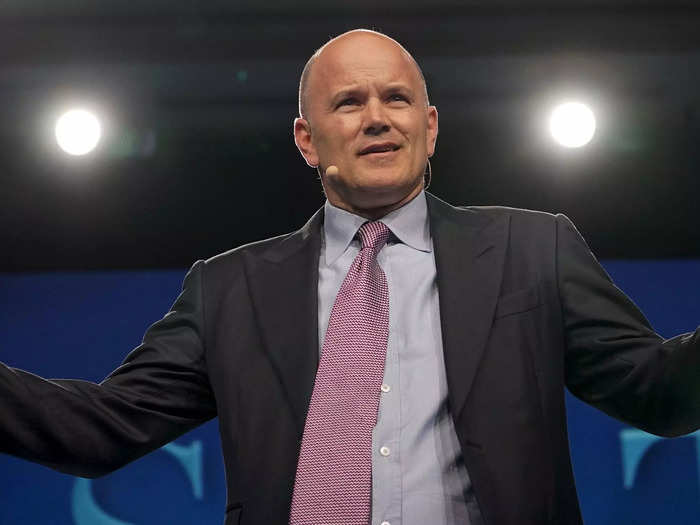Michael Burry.Astrid Stawiarz/Getty Images
- Crypto fans, critics, and commentators have weighed in after the recent market crash.
- Michael Burry, Paul Krugman, Mark Cuban, Jim Chanos, and others have shared their views.
Bitcoin, ethereum, and other cryptocurrencies have plunged in value in recent weeks, sparking a flurry of comments from critics, proponents, and other market watchers.
Michael Burry has underlined bitcoin's volatility, while Paul Krugman and Jim Chanos have seized on the crypto crash as evidence the industry is built on hype and speculation, and best seen as a hotbed of fraud, corruption, and predatory behavior.
In contrast, Mark Cuban and Mike Novogratz have predicted the market downturn will help clean up the crypto ecosystem, and separate the truly valuable companies and tokens from the rest.
Meanwhile, Suze Orman has warned crypto fans to be careful buying the dip, and Tom Siebel has predicted that plunging coin prices and soaring living costs could drive crypto workers back into traditional jobs.
Here's a roundup of what these 7 commentators have said about the crypto crash:
Michael Burry
Jim Spellman/Getty Images
Michael Burry took aim at bitcoin in a recent tweet, noting the most-valuable crypto has moved almost in tandem with the largest US tech stocks in recent months.
"Are we sure Bitcoin is not just another risk asset in the Nasdaq 100?" the investor of "The Big Short" fame tweeted. He attached a chart showing bitcoin's price — which has plunged from over $60,000 in November to about $21,000 today — has followed a similar downward trajectory to the stock-market index.
Burry has previously described bitcoin as a "speculative bubble," and warned central banks might deem it a threat to their currencies and handicap its success.
The Scion Asset Management boss has also compared the crypto boom to the dot-com and housing bubbles, and cautioned that retail buyers of meme stocks and crypto are barreling towards the "mother of all crashes."
Paul Krugman
Brendan McDermid/Reuters
Paul Krugman framed the crash in crypto prices as inevitable in a recent New York Times column.
"If you believe, as I do, that crypto is to a large extent a Ponzi scheme, this may just happen to be the moment when the scheme has run out of new suckers," he said.
The veteran economist and Nobel laureate compared the crypto boom to the housing bubble in another column earlier this month.
He noted that most Americans couldn't believe that house prices might be hugely inflated, and trillions of dollars of real-estate wealth could potentially be lost — and drew a parallel to crypto fans struggling to accept their coins might be worthless.
"If you ask me, it looks as if we've gone from the Big Short to the Big Scam," Krugman said.
Jim Chanos
Jim Chanos CNBC/Getty
Jim Chanos blasted the crypto industry during a recent episode of Bloomberg's "Odd Lots" podcast.
"A lot of the concepts behind crypto's early adoption have proven to basically be not there or wanting," he said, asserting tokens haven't replaced dollars, and have failed to act as portfolio hedges.
The veteran short-seller and Kynikos Associates chief also compared some crypto firms to Ponzi schemes, and accused them of ripping off customers.
"I've called it a predatory junkyard, and I stand by that," he said about the broader crypto space. "This vast ecosystem sprung up overnight around it to basically extract fees from unsuspecting, primarily retail, investors."
Mark Cuban
Mark Cuban. Brian Snyder/Reuters
Mark Cuban warned the market downturn would force bad crypto businesses to fold during a recent Fortune interview.
"In stocks and crypto, you will see companies that were sustained by cheap, easy money — but didn't have valid business prospects — disappear," he said.
However, the tech billionaire and "Shark Tank" investor predicted any crypto firms offering game-changing applications and innovations would succeed in attracting customers, and shrug off the expected flurry of interest-rate hikes this year.
Cuban has previously declared that only a handful of crypto tokens will become world-beaters, while others won't survive.
"Bitcoin, Ethereum, a few others will be analogous to those that were built during the dot-com era, survived the bubble bursting and thrived, like Amazon, eBay, and Priceline," Cuban tweeted in January 2021. "Many won't."
Mike Novogratz
REUTERS/Rick Wilking
Mike Novogratz, during a raft of recent appearances, suggested the crash in token prices could help eliminate some of the excessive leverage from the fledgling crypto industry.
"When you have really big players that have borrowed money from all over the place, it creates a daisy-chain effect," the Galaxy Digital CEO said. "That is burning through the system right now. My sense is it's mostly burned out, but these fires go until they run out of oxygen."
Novogratz also cautioned the crypto ecosystem would need time to recover.
"A lot of confidence got kicked out of the market," he said. "It's going to take a while for Humpty Dumpty to get put back together again."
On the other hand, the crypto bull predicted the price of bitcoin would "explode north" as soon as the Federal Reserve stops hiking interest rates.
Suze Orman
Leigh Vogel / Stringer / Getty
Suze Orman urged crypto buyers to exercise caution during a recent Yahoo Finance interview.
"Bitcoin, ethereum, solana, all of them — you have to be a little careful right now," the personal-finance guru said, citing the shifting regulatory backdrop for tokens.
"My advice is you can put a small part of your portfolio in it, no more than 5%," Orman continued. "I would only put money in it that I could afford to lose, because there are too many unknowns with it."
The "Women & Money" author and podcast host added that blockchain technology could be revolutionary, and suggested improvements to the ethereum network might send the price of ether skyward.
Tom Siebel
Tom Siebel is the founder and CEO of C3.ai. C3.ai
Scores of workers quit their jobs to join crypto companies during the pandemic. The recent blow to their investment portfolios, coupled with the soaring cost of living, could force them to return to traditional roles, Tom Siebel predicted during a recent conference.
"All these people went home to work in their PJs and get paid in bitcoin," the billionaire founder and CEO of C3.AI said. "Their stock is worth 10% of what it used to be, okay?"
"The rent has gone up 30%," the early Oracle executive continued. "The groceries have gone up 25%."
"They're saying, 'Oh dear, I need to go get a job,'" Siebel added. "Things are going to change."







